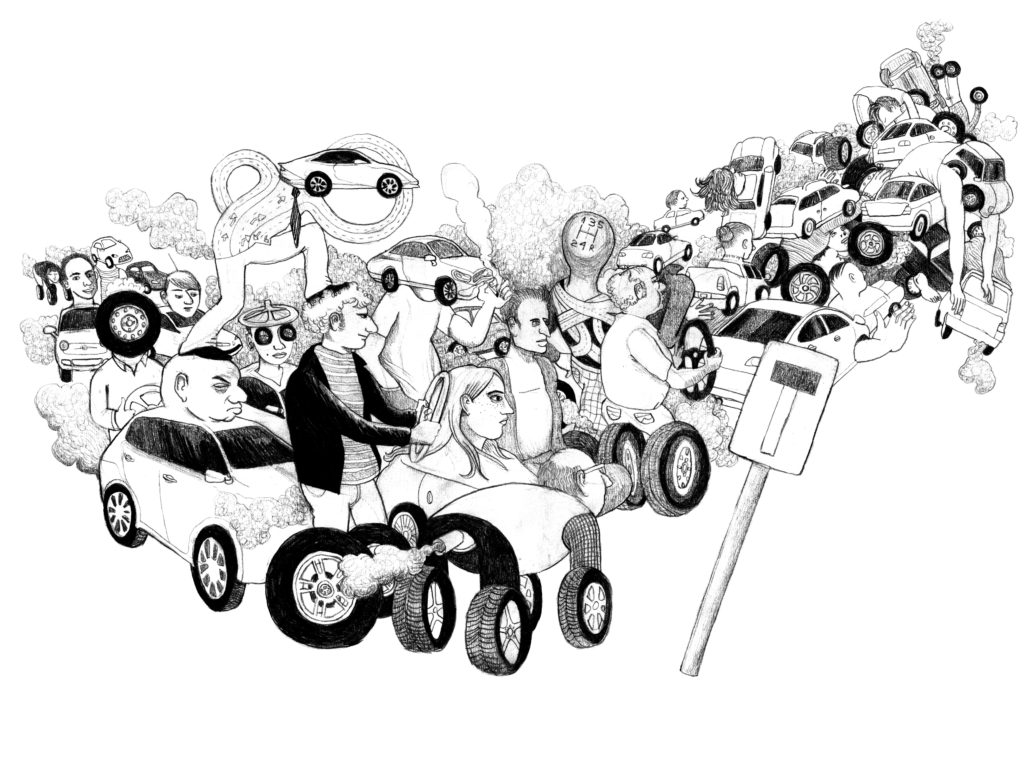Julian Assange
622 weeks of deprivation of liberty for telling the truth
622 weeks of deprivation of liberty for telling the truth

The car, the car, the automobile, the crate, the tank, the tugboat…, it has been the talk of the town ever since the one that was also called « The obedient one » could, for the first time, in 1873, tread the pavement. Having exceeded one billion units on our beautiful planet in 2007, its production increases every year: 76,000,000 in 2011, 81,700,000 in 2012, 83,000,000 in 2013, 89,774,000 in 2014, 90,680,000 in 2015… It is also said to be growing, bringing with it its processions of deaths, pollution, asphalt, urban sprawl. It grows… and that’s good for growth. The car makes everyone agree, you have to believe in it, like a religion, it is part of the decor, whether you come from the extreme left, the extreme right, the left, the center, whether you are a reformist or a revolutionary…; only the solutions differ, but the individual object must remain: it is, like the nature that it destroys, an intangible.
There is no escaping it, having a car has become, like eating, a need. Indoctrination through practice, which from the first days of life puts the child in contact with « little cars », harnesses us to the back seat and gradually with age makes us move towards the driver’s seat, has something to do with it: the « back seat » generation makes its adult followers who will ensure the succession of the following generation. The landscape is also part of it. We see the cars, we live their massification, we breathe with them. It is impossible to escape them, they are part of the decor of our lives and our cities. They are like the tree that grows, the arbitrary taking on the clothes of the natural: « Each of us has a car and takes care of it « 1. And if you were to have doubts and tell a neighbor, the argument of necessity is sure to come out: « I can’t do without it »… often specious, it is however sometimes based on a truth proper to the productivist system that creates needs and then makes sure that reality takes over, spaces being now designed for the car, moving from the necessity to the indispensable.
To speak of the car is to speak of something else, to go beyond what it is to see it as a symbol of our productivist societies, to use it as a model that sheds light on what we are. Indispensable for the revival of the capitalist system in the Fordist era, it is just as essential today for the sacrosanct economic growth. By attacking the car, we take an intermediary to think the world and its system. Because the car is more than an object, it is a model of thought: the car is the ideology of the infinitude of our world, the every man for himself, the extractivism to the point of breakdown2. To simply refuse to accept this state of affairs is to give a certain incoherence to our actions, not to see that what we oppose is often only the result of a society doped with oil (fight for the support of refugees, fight against nuclear power plants, mass consumption, wars, destruction of nature…).
The car is also the reign of social immobility: because who is going to turn off his engine and get out of the traffic jam, accepting at last that the party is over and that solutions will have to be found elsewhere, even if they « deprive » him of something, rather than continuing to asphyxiate his fellow human beings and nature? Each one consumes it, each one has its good reasons, each one… The individual choice signing the individual disresponsibility which leads to the collective disaster that we know, which leads to the fact that in 2007 we exceeded the billion cars on earth…
Let’s take the time to think, far from passions, to describe with André Gorz the social ideology of the car (p. 14–15), but also to better understand it by interviewing one of its faithful representatives, the one who fights so that others have the « right to drive and park in Brussels » (p. 10–11). What is the need analyzed in relation to the need for the car (p. 16)? Wouldn’t it be based on a subterfuge, a great trap that would allow us to continue to believe, while we would not actually move any faster in a car than on foot (page 18), lulling us with the chimeras of the electric car (page 17), bewitching the person and preventing us from collectively thinking about the world we want.
File coordinated by Alexandre Penasse